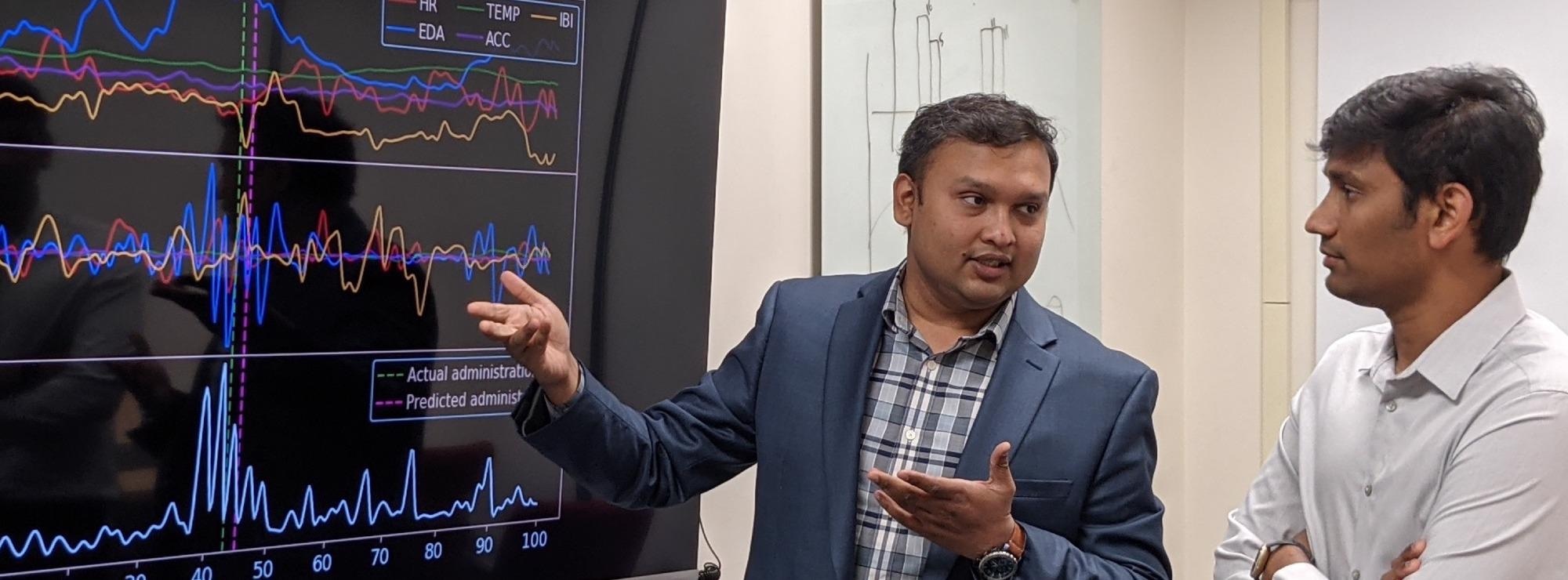A group of researchers including a University of Massachusetts Amherst computer scientist has been given a $1.1 million grant to further improve a smartwatch sensor engineered to support the long-term recovery of individuals with opioid use disorder (OUD).
 UMass Amherst assistant professor Tauhidur Rahman and Ph.D. student Bhanu Teja Gullapalli discuss their research findings. (Image Credit: University of Massachusetts Amherst).
UMass Amherst assistant professor Tauhidur Rahman and Ph.D. student Bhanu Teja Gullapalli discuss their research findings. (Image Credit: University of Massachusetts Amherst).
Mobile sensor expert Tauhidur Rahman, assistant professor in the College of Information and Computer Sciences, is working together with colleagues at Syracuse University and SUNY Upstate Medical University on the project, financed by the National Science Foundation’s Smart and Connected Health program.
We have the technology to detect these craving moments and incorporate an intervention to avoid scenarios of drug use.
Tauhidur Rahman, Assistant Professor, College of Information and Computer Sciences, University of Massachusetts Amherst
Rahman, who co-directs the MOSAIC Lab, focuses on developing mobile, health-related sensors at the lab.
The miniature, wireless sensor uses machine learning to establish if the psychophysiological signs identified in real-time by respiration and electrocardiogram (ECG) are consistent with opioid cravings. Such cravings are one of the main causes of OUD relapse and lethal overdose following a time of abstinence.
Once a craving is sensed, the sensor sends out an alert to the user with mindfulness-based interventions that eventually can be customized based on the behaviors of the user and input from their clinician.
Nothing like this exists today. And we believe that mobile technologies can provide an effective mechanism for people with addiction to monitor their condition and manage their cravings better.
Tauhidur Rahman, Assistant Professor, College of Information and Computer Sciences, University of Massachusetts Amherst
The present project grew from research reported in 2019 by Rahman, lead author Bhanu Teja Gullapalli — a Ph.D. student working in Rahman’s lab — and others on the use of cardiac and respiratory signals to detect euphoria, cocaine craving and drug-seeking behavior.
In September, the scientists published an article in Proceedings of the ACM on Interactive, Mobile, Wearable and Ubiquitous Technologies on monitoring opioid use with a wearable device and creating predictive models with the help of machine learning.
They observed 36 hospitalized patients who were given opioid medication for acute pain as part of their care. The patients wore a wrist sensor that nonstop computed physiological signals.
The machine-learning factor of the research involves carrying out a series of mathematical processes known as convolution.
Once we run convolution, we extract features of the raw data and then train neural networks that can automatically learn to see the physical characteristics and physiological trends that indicate opioid use.
Tauhidur Rahman, Assistant Professor, College of Information and Computer Sciences, University of Massachusetts Amherst
“So, just by looking at a watch and monitoring a few parameters, we can tell when someone has taken an opioid. We have 80 percent accuracy on a high level with our current form of technology,” Rahman added.
The study can be scaled-up to incorporate other substance use disorders, and the NSF-sponsored project comprises educational and awareness workshops for middle-school girls and a machine-learning course for clinicians.
Gullapalli states that the sensor in progress could also be used to guarantee the correct use of prescribed opioid pain medications and stop OUD.
“The doctor can ask the patient to wear the smartwatch and the system will track how frequently the patient is using the drug, how the patient’s physiology is changing and determine if the patient is developing a dependence on opioids,” explains Gullapalli.
Gullapalli has been accepted into Yale's extremely selective Innovation to Impact program for entrepreneurship for substance use disorder, supported by the National Institute on Drug Abuse.
The NSF project’s goal is to progress and verify the groundbreaking technology.
“Successful execution of the research will begin to test the effectiveness of integrating passive sensing, adaptive artificial intelligence (AI) and mindfulness interventions on regulating drug craving,” the grant summary mentions.
Journal Reference:
Gullapalli, B.T., et al. (2021) OpiTrack: A Wearable-based Clinical Opioid Use Tracker with Temporal Convolutional Attention Networks. Proceedings of the ACM on Interactive, Mobile, Wearable, and Ubiquitous Technologies. doi.org/10.1145/3478107.
Source: https://www.umass.edu